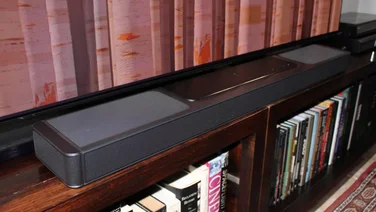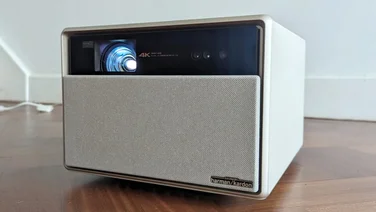TVs & Home Cinema

The best streaming sticks to buy, tried and tested
Our roundup of the best TV streaming sticks available, with options to suit any budget
-
 Panasonic announces strategic TV partnership with Skyworth before revealing its new range Panasonic becomes the second Japanese TV brand to partner with a Chinese manufacturer this year - the TV landscape is changing, and it’s changing fast
Panasonic announces strategic TV partnership with Skyworth before revealing its new range Panasonic becomes the second Japanese TV brand to partner with a Chinese manufacturer this year - the TV landscape is changing, and it’s changing fast -
best buy
 Manhattan Aero 4K TV Streamer with Freely review: Free IPTV for the masses Some key apps may be absent, but this TiVo-powered 4K streaming box provides tons of free content, including Freely channels and services, for very reasonable money£70
Manhattan Aero 4K TV Streamer with Freely review: Free IPTV for the masses Some key apps may be absent, but this TiVo-powered 4K streaming box provides tons of free content, including Freely channels and services, for very reasonable money£70 -
best buy
 XGIMI Horizon 20 Max review: The new compact living room projector king A superb living room projector across TV, games and movies, balancing easy setup, simple streaming and real control£2599
XGIMI Horizon 20 Max review: The new compact living room projector king A superb living room projector across TV, games and movies, balancing easy setup, simple streaming and real control£2599 -
best buy
 Sony Bravia 5 (K65XR55BP) review: Where mid-range doesn’t mean middle of the road Can this relatively stripped-back mid-ranger keep the Bravia flag flying, or have there been too many cutbacks for comfort?£1399
Sony Bravia 5 (K65XR55BP) review: Where mid-range doesn’t mean middle of the road Can this relatively stripped-back mid-ranger keep the Bravia flag flying, or have there been too many cutbacks for comfort?£1399 -
 The best TVs to buy in 2026 Not sure which TV is right for you? We’ve tested all of the top sets to help you pick the best TV for any budget and any room
The best TVs to buy in 2026 Not sure which TV is right for you? We’ve tested all of the top sets to help you pick the best TV for any budget and any room -
 The best soundbars for boosting your TV’s audio Upgrade your television’s sound with the best soundbars we've tested
The best soundbars for boosting your TV’s audio Upgrade your television’s sound with the best soundbars we've tested -
 The best projectors to buy in 2026 Looking for the ultimate big-screen thrills? We’ve picked out the best 1080p and 4K projectors, tried and tested by us
The best projectors to buy in 2026 Looking for the ultimate big-screen thrills? We’ve picked out the best 1080p and 4K projectors, tried and tested by us -
 Some Sky customers are getting Disney Plus and HBO Max for free Sky adds three new streaming apps - for nothing - to its Sky Ultimate TV package, but it's not all good news
Some Sky customers are getting Disney Plus and HBO Max for free Sky adds three new streaming apps - for nothing - to its Sky Ultimate TV package, but it's not all good news -
 Marshall Heston 60 review: The compact soundbar to beat? Marshall’s answer to the Sonos Beam 2 has some advantages over its main rival. Is it the new compact all-in-one soundbar to beat?£500
Marshall Heston 60 review: The compact soundbar to beat? Marshall’s answer to the Sonos Beam 2 has some advantages over its main rival. Is it the new compact all-in-one soundbar to beat?£500 -
 Amazon’s new Fire TVs are available in the UK at enticing introductory offer prices, but not for long You can now get your hands on the updated Fire TV 2-Series, 4-Series and Omni QLED tellies, and they’re discounted until 10 February
Amazon’s new Fire TVs are available in the UK at enticing introductory offer prices, but not for long You can now get your hands on the updated Fire TV 2-Series, 4-Series and Omni QLED tellies, and they’re discounted until 10 February -
 A new way to enjoy Freely on ANY TV is coming, and it’s coming very soon The Manhattan Aero 4K TV Streamer with Freely will be available from February and will provide access to Freely services on any television
A new way to enjoy Freely on ANY TV is coming, and it’s coming very soon The Manhattan Aero 4K TV Streamer with Freely will be available from February and will provide access to Freely services on any television -
best buy
 XGIMI Titan review: The big screen experience just got bigger A mighty high-end projector with fantastic clarity, colour and HDR performance. Too big for the average living room, but superb for big-screen home cinema£3499
XGIMI Titan review: The big screen experience just got bigger A mighty high-end projector with fantastic clarity, colour and HDR performance. Too big for the average living room, but superb for big-screen home cinema£3499 -
best buy
 Philips OLED810 (77OLED810) review: Surprisingly simple pleasures A few settings of this eye-catching Philips OLED mid-ranger need handling with care, but otherwise this is one of the biggest - literally - TV bargains in town£2199
Philips OLED810 (77OLED810) review: Surprisingly simple pleasures A few settings of this eye-catching Philips OLED mid-ranger need handling with care, but otherwise this is one of the biggest - literally - TV bargains in town£2199